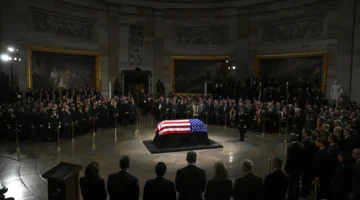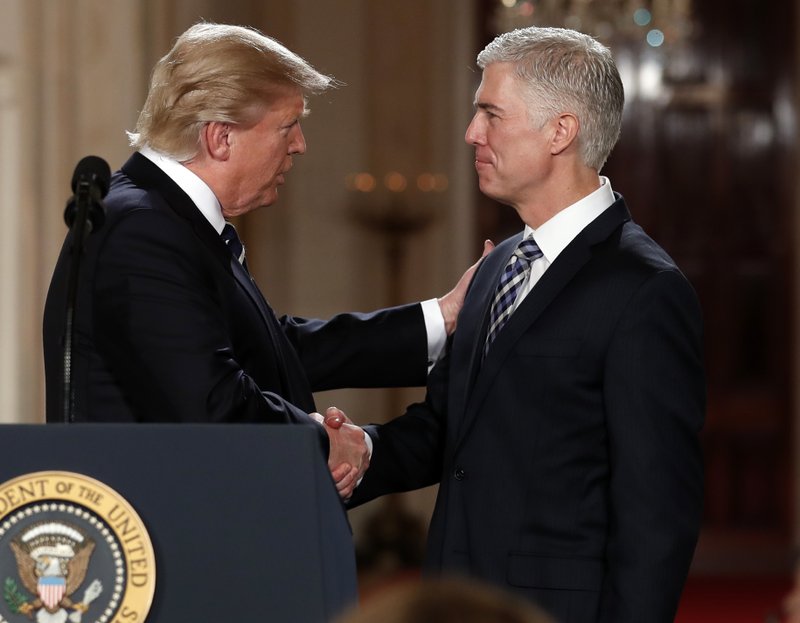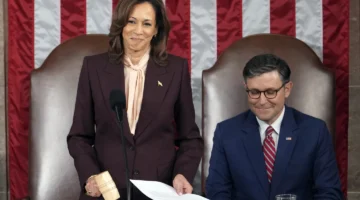Trump’s Supreme Court pick wary of ‘politicians with robes’
Judge Neil Gorsuch recalls being blinded by tears in the middle of a ski run after someone rang his cellphone with news of the unexpected death of Supreme Court Justice Antonin Scalia. The reaction illustrates not only the depth of Gorsuch’s admiration for his mentor but also how thoroughly he has modeled his conservative constitutionalist views after Scalia.
“I immediately lost what breath I had,” Gorsuch, who sits on the 10th U.S. Circuit Court of Appeals, said in a speech last April. “And I am not embarrassed to admit that I couldn’t see the rest of the way down the mountain for the tears.”
One year later, the 49-year-old Colorado native is President Donald Trump’s pick to replace Scalia as the Republican leader heeded calls by many conservatives to find someone as near to a Scalia philosophical clone as possible.
Like Scalia, Gorsuch believes judges must focus primarily on the text of the 230-year-old Constitution and resolve legal disputes by following the Founding Fathers’ intentions. Gorsuch has said that if judges factor in personal beliefs, societal changes or calculations about maximizing social welfare, they risk becoming “little more than politicians with robes.”
Gorsuch, who once went fly-fishing with Scalia, said Scalia helped remind Americans about the roles of judges and lawmakers. In a speech last year at Case Western Reserve University, Gorsuch said that message was that “legislators may appeal to their own moral convictions and to claims about social utility to reshape law. … But that judges should do none of these things in a democratic society.”
Scalia, who died last February, was a leading proponent of originalism, an approach that seeks to resolve constitutional disputes by focusing on the document’s text, its historical context and the framers’ intentions. Originalism often is viewed as a conservative philosophy, but adherents can often hold strong civil libertarian views. Scalia, for example, held that flag burning was protected speech.
Scalia frequently complained that the concept of originalism was misunderstood. He explained that an emphasis on text and historical context is flexible enough to be applied to modern phenomena like radio and the internet. And he said originalism left open avenues for change, including through constitutional amendments and legislation.
“You want to create new rights and/or destroy old ones?” Scalia asked in a 1996 speech. “A legislature and the electoral franchise are all that you need. The only reason you need a constitution is because there are some things which you don’t want a majority to be able to change.”
Originalism’s critics say judges should treat the Constitution as a living, breathing document that’s able to encompass society’s evolving values. An example of this approach is the 2015 Supreme Court ruling that says constitutional rights to due process and equal protection supports a right to same-sex marriage. In his dissent, Chief Justice John G. Roberts Jr. wrote that the Constitution “had nothing to do with” that ruling by the court majority.
In his 2016 speech, Gorsuch also quoted Scalia as saying that, to be a good judge, “you have to resign yourself to the fact that you’re not always going to like the conclusions you reach. If you like them all the time, you’re probably doing something wrong.”
Despite his adherence to a conservative legal philosophy, Gorsuch has also warned against rigidity. When asked at his 2006 confirmation hearings for the appeals court about the kind of judge he considers unacceptable, Gorsuch answered: “Someone who is not willing to listen with an open mind to the arguments of counsel, to his colleagues, and to precedent.”
But Gorsuch’s tendency to harken back to the framers is reflected in his sharp criticism of the Chevron doctrine, which holds that judges should defer to federal departments and agencies to fill in the blanks of certain laws, including on immigration and the environment. The framers, Gorsuch wrote last year, intended for lawmakers to make the laws, executives to execute them and judges to decipher their meaning.
“A government of diffused powers, they knew, is a government less capable of invading the liberties of the people,” he wrote.
Gorsuch incorporated wariness of executive power in a dissent after the full 10th Circuit declined to rehear a three-judge panel’s ruling that a sex offender should comply with detailed rules about registering as a sex offender. Those rules were set not by Congress, but by the U.S. attorney general.
“If the separation of powers means anything, it must mean that the prosecutor isn’t allowed to define the crimes he gets to enforce,” Gorsuch wrote in 2015.
If political leaders differ with judges over existing law, Gorsuch wrote, politicians always had a clear constitutional remedy: “It’s called legislation. … Admittedly, the legislative process can be an arduous one. But that’s no bug in the constitutional design: It is the very point of the design.”
Originalists such as Gorsuch also apply their philosophy to resolve disagreements over laws crafted by Congress or state legislatures, focusing on the text and intention of the lawmakers.
In a 2012 dissent in an appeal of a federal law that bans felons from possessing guns, Gorsuch wrote: “When the current statute’s language is clear, it must be enforced just as Congress wrote it. … Congress could have written the law differently than it did, and it is always free to rewrite the law when it wishes. But in our legal order it is the role of the courts to apply the law as it is written, not some different law Congress might have written in the past or might write in the future.”
Gorsuch has argued that liberals are too quick to file lawsuits as a way to force change, even though there’s “no doubt that constitutional lawsuits have secured critical civil-rights victories,” including desegregation. He said that reliance can end up hardening divisions.
“In the legislative arena, especially when the country is closely divided, compromises tend to be the rule of the day,” he wrote in the National Review in 2005. “But when judges rule this or that policy unconstitutional, there’s little room for compromise: One side must win, the other must lose.”
___
Tarm reported from Chicago and Lavoie from Boston. AP Researcher Rhonda Shafner also contributed.
___
The AP National Investigative Team can be reached at [email protected]







No Comment